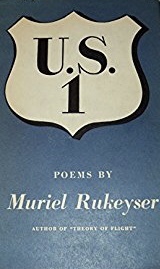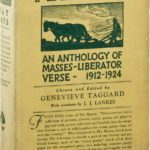Podcast: Play in new window | Download (Duration: 59:00 — 44.8MB)
 Our opening song is “Ezz-thetic,” from the 1961 release Ezz-thetics by George Russell.
Our opening song is “Ezz-thetic,” from the 1961 release Ezz-thetics by George Russell.
In the conversation to come we’ll make reference to the American modernist poet Ezra Pound, and what the literary scholar Hugh Kenner termed “The Pound Era” in his 1971 book.
Pound is perhaps best known for the poetic movement he named Imagism and for his endlessly expanding book The Cantos. But he may be better known for his arrest for treason in 1945 for his over 300 broadcasts for “The American Hour” on Radio Roma attacking the United States, Roosevelt, Roosevelt’s family, Churchill, and the Jews while praising Hitler’s Mein Kampf and recommending eugenics to “conserve the best of the race” rather than commit “race suicide.” And yet even as Pound’s embrace and promotion of fascism was well-known, he was awarded the Bollingen Prize by the Library of Congress in 1949. Hugh Kenner’s first book about Pound was published in 1951.

But Ezra Pound is not our topic today. Rather we wish to sweep him aside to make space for other poets and other ways of reading and writing poetry. It takes some effort to discover how and why poetry can matter, especially when that poetry has been forgotten and those poets nearly purged from our literary history. Poetry matters very much when we confront the ideological capture of our institutions of learning – when we discover the politics of poetry. And poetry matters very much when the rehabilitation of the fascist poet coincides with the McCarthy era in America.
Today, we’ll resurface three poets on the political Left who wrote during the 1930s and 40s: Muriel Rukeyser, Genevieve Taggard, and Martha Millet.
 Muriel Rukeyser is easily the best known of the three and her great poem series The Book of the Dead has recently been reissued by West Virginia University Press. It is a powerful account of one of the worst industrial catastrophes in American history, one that killed hundreds of workers, most of them African American. Our guest today, Sarah Ehlers, speaks of this work as a “history that hurts sung from a brick throat.”
Muriel Rukeyser is easily the best known of the three and her great poem series The Book of the Dead has recently been reissued by West Virginia University Press. It is a powerful account of one of the worst industrial catastrophes in American history, one that killed hundreds of workers, most of them African American. Our guest today, Sarah Ehlers, speaks of this work as a “history that hurts sung from a brick throat.”
Genevieve Taggard, a socialist affiliated with the Communist Party, actually published twelve books of poetry beginning in 1922 as well as a lively biography of Emily Dickinson.
 Communist Martha Millet, a red-diaper-baby, was fired for her political views, and much of her work has gone unpublished or is out of print. One of those unpublished manuscripts is an investigation into the life, work, and influence of Ezra Pound tentatively titled The Ezra Pound Myth written during the same period that Kenner worked on The Pound Era.
Communist Martha Millet, a red-diaper-baby, was fired for her political views, and much of her work has gone unpublished or is out of print. One of those unpublished manuscripts is an investigation into the life, work, and influence of Ezra Pound tentatively titled The Ezra Pound Myth written during the same period that Kenner worked on The Pound Era.
GUEST
 Sarah Ehlers is an associate professor of English at the University of Houston and author of Left of Poetry: Depression America and the Formation of Modern Poetics, published in 2019 by the University of North Carolina Press.
Sarah Ehlers is an associate professor of English at the University of Houston and author of Left of Poetry: Depression America and the Formation of Modern Poetics, published in 2019 by the University of North Carolina Press.
RELATED
U.S. Poetry and the Politics of Form by Sarah Ehlers (book review)
Recalling Poet Muriel Rukeyser and her Work on the Hawk’s Nest Tunnel Disaster
Communism for Kids: Martha Millet, the New Pioneer, and the Popularity of the Old Left by Sarah Ehlers
Tracking Subversives: Alan Wald On the Development of the Literary Left (Interchange)
“The Book of the Dead: Absalom” by Muriel Rukeyser
MUSIC
“Ezz-thetic” by George Russell
“Silicosis Is Killing Me” by Josh White
“The Lark” by Aaron Copland
“The Communists Have the Music” by They Might Be Giants
“Children’s Play Song” by Bill Evans
POEMS (Music)
“Absalom” by Muriel Rukeyser (Joanna Brouk, “The Space Between”)
“Funeral in May” by Genevieve Taggard (Ornette Coleman, “Embraceable You”)
“Unforgotten Village” by Martha Millet (Peter Brötzmann, “Milan-Milan!”)
CREDITS
Producer & Host: Doug Storm
Executive Producer: Kade Young
 WFHB Bloomington Community Radio
WFHB Bloomington Community Radio


